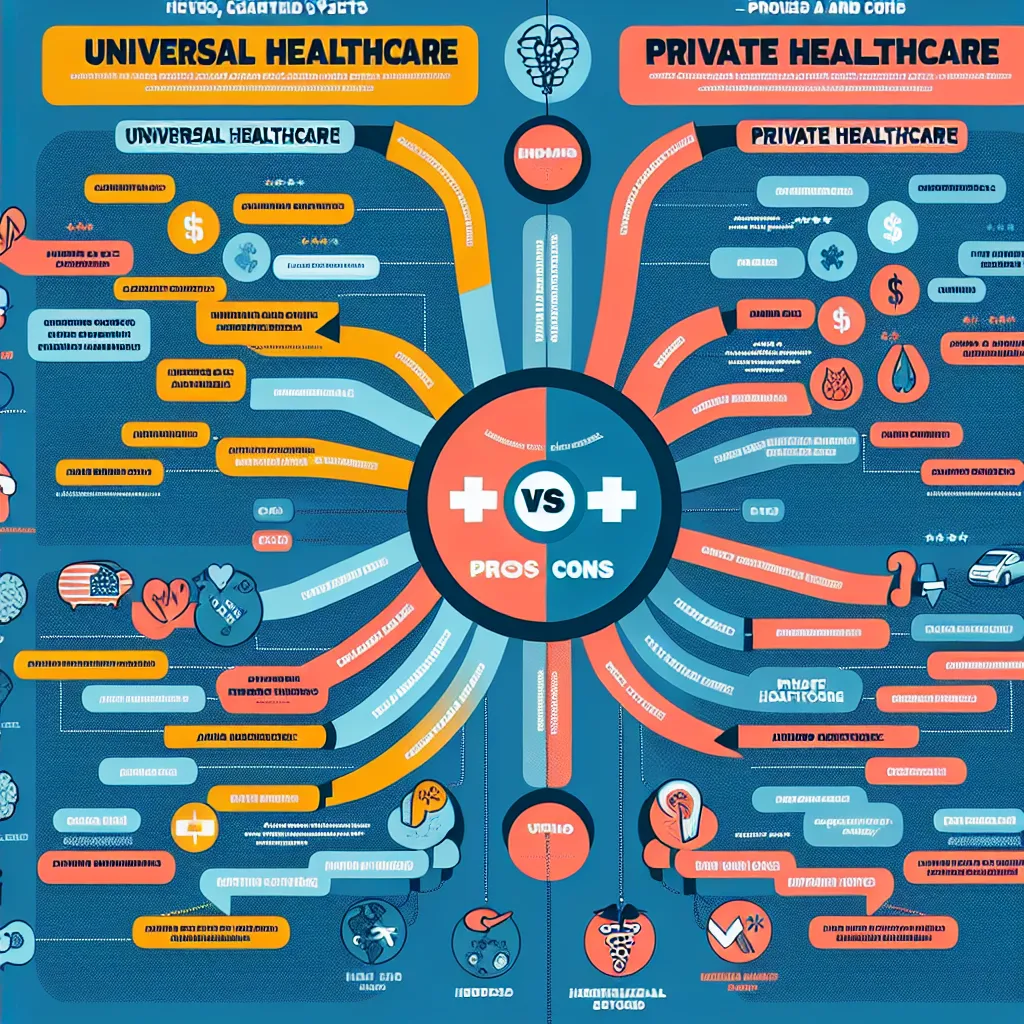In recent years, the topic of government-provided free healthcare for all citizens has become increasingly prevalent in IELTS Writing Task 2 exams. This subject not only reflects current global debates but also allows test-takers to demonstrate their analytical and writing skills on a complex socio-economic issue. Based on past exam trends and the growing importance of healthcare worldwide, we can expect this topic to appear frequently in future IELTS tests. Let’s explore a typical question on this subject and analyze sample essays for different band scores.
Nội dung bài viết
Analyzing the Task Question
Some people believe that governments should provide free healthcare for all citizens. Others think that this would be too expensive and there are better alternatives. Discuss both views and give your own opinion.
This question presents a balanced argument task, requiring candidates to:
- Discuss the view that governments should provide free healthcare for all
- Explore the opposing view that this is too expensive and there are better alternatives
- Provide and justify their own opinion on the matter
Key points to address:
- Pros and cons of free healthcare for all
- Economic implications for the government
- Potential alternatives to universal free healthcare
- Personal stance based on the arguments presented
Sample Essays for Different Band Scores
Band 8-9 Essay Sample
The provision of free healthcare for all citizens by governments is a contentious issue that has sparked debates worldwide. While some argue that this approach ensures universal access to essential medical services, others contend that it is financially unsustainable and that better alternatives exist. This essay will examine both perspectives before presenting my own viewpoint.
Proponents of government-funded universal healthcare argue that it is a fundamental human right and a cornerstone of a just society. They assert that free access to medical services promotes public health, reduces inequality, and contributes to overall societal well-being. Moreover, a healthier population is likely to be more productive, potentially offsetting the initial costs of implementing such a system. Countries like Canada and the United Kingdom have demonstrated that universal healthcare can be successfully implemented, leading to improved health outcomes and life expectancy.
On the other hand, critics argue that providing free healthcare for all citizens is an enormous financial burden that many governments cannot bear. They contend that the quality of care may decline due to increased demand and limited resources, leading to longer wait times and reduced efficiency. Furthermore, they suggest that a lack of market competition could stifle innovation in medical research and technology. Alternatives proposed include a mixed system of public and private healthcare, means-tested subsidies, or mandatory health insurance schemes that balance accessibility with financial sustainability.
In my opinion, while the ideal of free healthcare for all is admirable, a more nuanced approach is necessary to address the complex realities of modern healthcare systems. I believe that governments should strive to provide a basic level of healthcare for all citizens, particularly focusing on preventive care and essential treatments. However, this could be complemented by a tiered system where additional services or expedited care are available through private insurance or out-of-pocket payments. This approach would ensure that no one is denied basic medical attention while still allowing for personal choice and maintaining incentives for innovation.
In conclusion, the debate over government-provided free healthcare is multifaceted, with valid arguments on both sides. While universal access to healthcare is crucial for societal well-being, it must be balanced against economic realities and the need for sustainable, high-quality medical services. A hybrid system that guarantees basic care for all while allowing for additional private options may offer the best compromise in addressing this complex issue.
(Word count: 377)
 Healthcare System Comparison
Healthcare System Comparison
Band 6-7 Essay Sample
The question of whether governments should provide free healthcare for everyone is a topic that many people have different opinions about. Some think it’s a good idea, while others say it costs too much money. In this essay, I will talk about both sides and give my own thoughts.
People who support free healthcare for all say it’s important because everyone should be able to see a doctor when they’re sick, no matter how much money they have. They believe that if the government pays for healthcare, it will make the whole country healthier. This could mean fewer sick days at work and school, which is good for the economy. Also, they say that countries like Canada have shown that this system can work well.
However, there are also people who think free healthcare for everyone is not a good idea. They worry that it would cost the government too much money, which might mean higher taxes for everyone. They also think that if healthcare is free, too many people might go to the doctor for small things, making wait times longer for people who are really sick. Some suggest that instead of making everything free, the government could help people who don’t have much money to pay for healthcare, while others who can afford it pay for themselves.
In my opinion, I think the best solution is somewhere in the middle. I believe that the government should make sure everyone can get basic healthcare, like check-ups and emergency care, without having to pay. But for other treatments that aren’t as urgent, people who can afford it could pay a little bit. This way, everyone gets the care they need, but the system doesn’t cost too much money.
To sum up, providing free healthcare for all citizens is a complicated issue with good points on both sides. While it’s important to make sure everyone can see a doctor when they need to, we also have to think about how much it costs. I think a mix of free basic care and some paid services could be a good way to solve this problem.
(Word count: 340)
Band 5-6 Essay Sample
Nowadays, many people talk about if the government should give free healthcare to everyone. Some people think it’s a good idea, but others say it’s too expensive. I will write about both ideas and tell what I think.
People who like free healthcare say it’s good because everyone can go to the doctor when they’re sick. They think it’s fair and helps poor people. Also, they say if everyone is healthy, they can work better and help the country.
But some people don’t agree. They say free healthcare costs too much money for the government. They worry that if it’s free, too many people will go to the doctor all the time, even for small problems. This might make it hard for very sick people to get help fast. These people think there are better ways to help, like only giving free healthcare to poor people.
I think both sides have good points. Healthcare is important, but it’s also expensive. Maybe the government can give some free healthcare, like for very sick people or children, but not everything. This way, people who need help can get it, but it doesn’t cost too much money.
In conclusion, free healthcare for everyone is a hard question. It’s good to help people, but we need to think about the money too. I think the best answer is to have some free healthcare, but not for everything.
(Word count: 228)
Explaining the Band Scores
Band 8-9 Essay Analysis
This essay demonstrates excellent writing skills and a sophisticated approach to the topic, warranting a high band score:
- Task Achievement: The essay fully addresses all parts of the task, presenting a well-developed response with relevant, extended, and supported ideas.
- Coherence and Cohesion: Ideas are logically organized with clear progression throughout. Paragraphs are well-linked, and cohesive devices are used effectively.
- Lexical Resource: A wide range of vocabulary is used with very natural and sophisticated control of lexical features. Rare minor errors occur only as ‘slips’.
- Grammatical Range and Accuracy: A wide range of structures is used with full flexibility and accuracy. The essay is virtually error-free.
Band 6-7 Essay Analysis
This essay shows a competent handling of the task, though with some limitations:
- Task Achievement: All parts of the task are addressed, though some parts are more fully covered than others.
- Coherence and Cohesion: Information and ideas are arranged coherently, and there is a clear overall progression. Cohesive devices are used effectively, though not always with full flexibility.
- Lexical Resource: An adequate range of vocabulary is used for the task. There are some attempts at more sophisticated vocabulary, though with occasional inaccuracy.
- Grammatical Range and Accuracy: A mix of simple and complex sentence forms is used. There are some errors, but they do not impede communication.
Band 5-6 Essay Analysis
This essay demonstrates a modest attempt at addressing the task:
- Task Achievement: The essay addresses the task only partially, with limited development of ideas and minimal use of examples.
- Coherence and Cohesion: The overall organization is evident, but not always logical. Basic cohesive devices are used, but coherence is often achieved through repetition.
- Lexical Resource: A limited range of vocabulary is used, adequate for basic communication but lacking precision for more complex ideas.
- Grammatical Range and Accuracy: Mostly simple sentences are used, with frequent errors that sometimes impede meaning.
Key Vocabulary to Remember
-
Universal healthcare (noun) /ˌjuːnɪˈvɜːsl ˈhelθkeə/: A system where all residents of a country are assured access to healthcare.
-
Socio-economic (adjective) /ˌsəʊsiəʊˌiːkəˈnɒmɪk/: Relating to or concerned with the interaction of social and economic factors.
-
Contentious (adjective) /kənˈtenʃəs/: Causing or likely to cause disagreement or argument.
-
Subsidize (verb) /ˈsʌbsɪdaɪz/: Support financially, often through government funds.
-
Sustainability (noun) /səˌsteɪnəˈbɪləti/: The ability to maintain or support a process continuously over time.
-
Preventive care (noun) /prɪˈventɪv keə/: Healthcare that focuses on preventing illness rather than treating it.
-
Innovation (noun) /ˌɪnəˈveɪʃn/: The introduction of new ideas, methods, or things.
-
Multifaceted (adjective) /ˌmʌltiˈfæsɪtɪd/: Having many different aspects or features.
-
Nuanced (adjective) /ˈnjuːɑːnst/: Characterized by subtle shades of meaning or expression.
-
Hybrid system (noun) /ˈhaɪbrɪd ˈsɪstəm/: A system that combines elements of two or more different approaches.
Conclusion
The topic of government-provided free healthcare for all citizens is a complex and nuanced issue that frequently appears in IELTS Writing Task 2. By understanding the different perspectives and being able to articulate them clearly, you can improve your chances of achieving a high band score. Remember to always address all parts of the question, use a range of vocabulary and grammatical structures, and organize your ideas coherently.
To further prepare for your IELTS exam, consider practicing with these related topics:
- Should governments prioritize healthcare spending over other sectors?
- Is privatization of healthcare services beneficial or detrimental to society?
- How can developing countries improve their healthcare systems with limited resources?
We encourage you to practice writing essays on these topics and share them in the comments section below. This active engagement will help you refine your writing skills and gain valuable feedback from others preparing for the IELTS exam.


